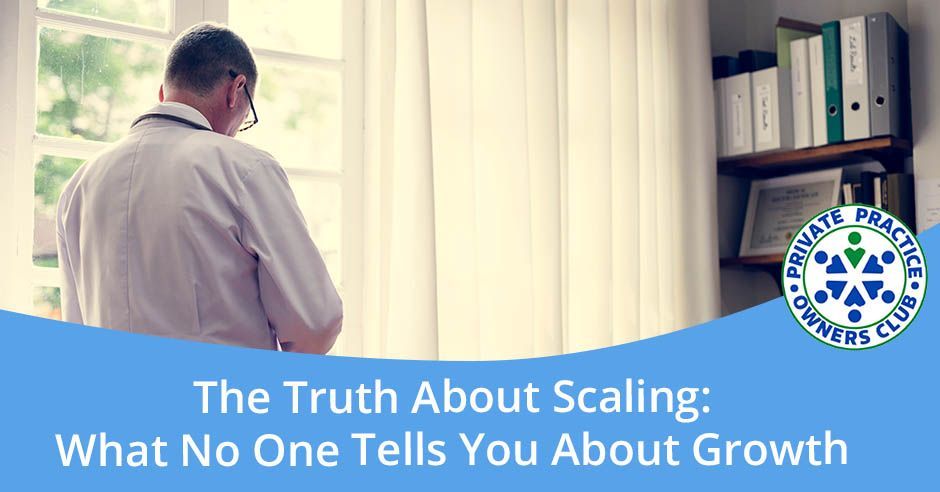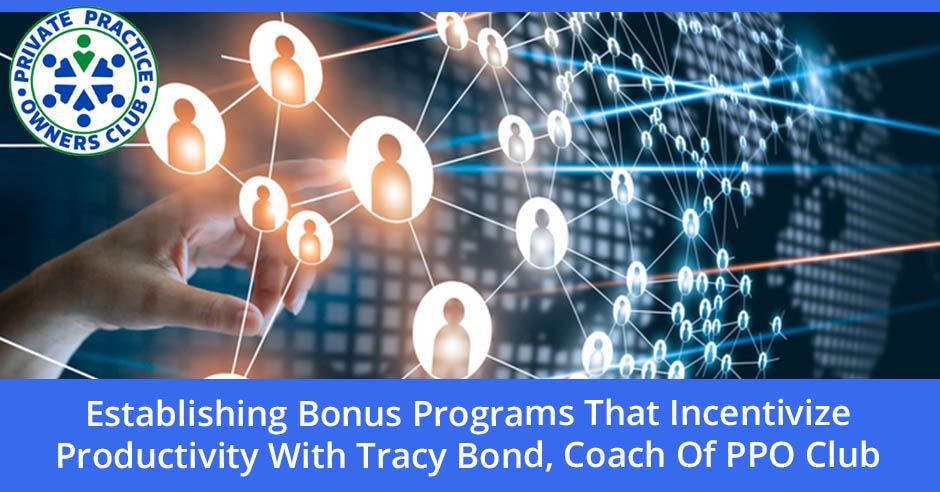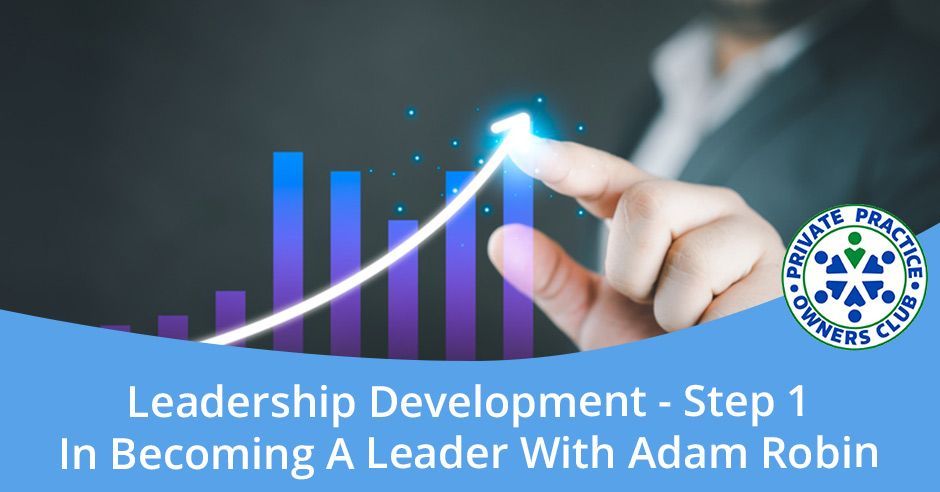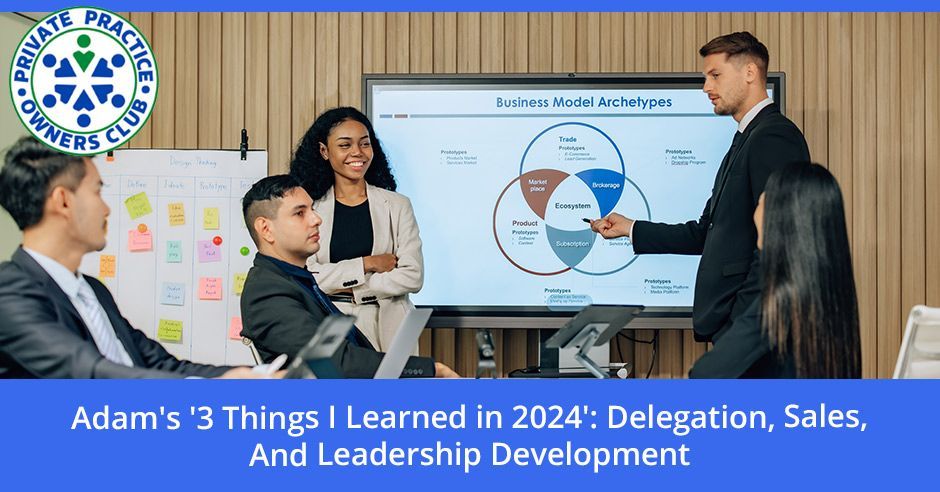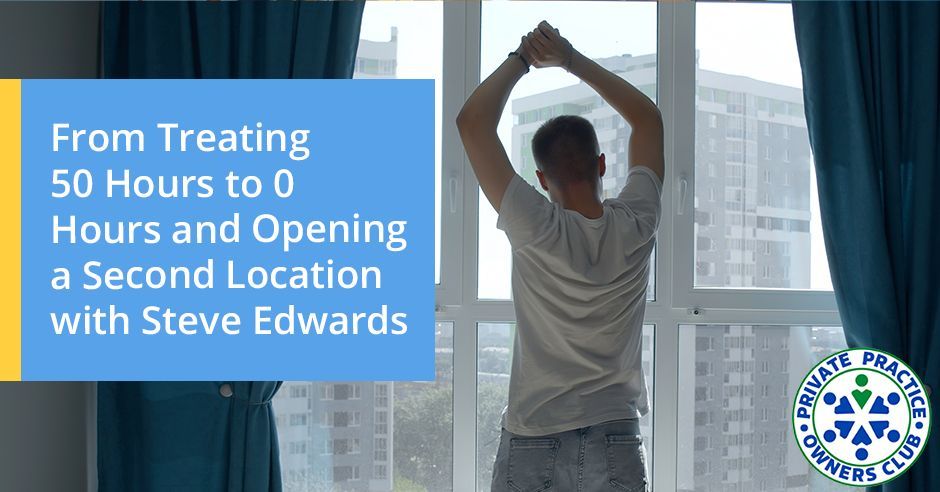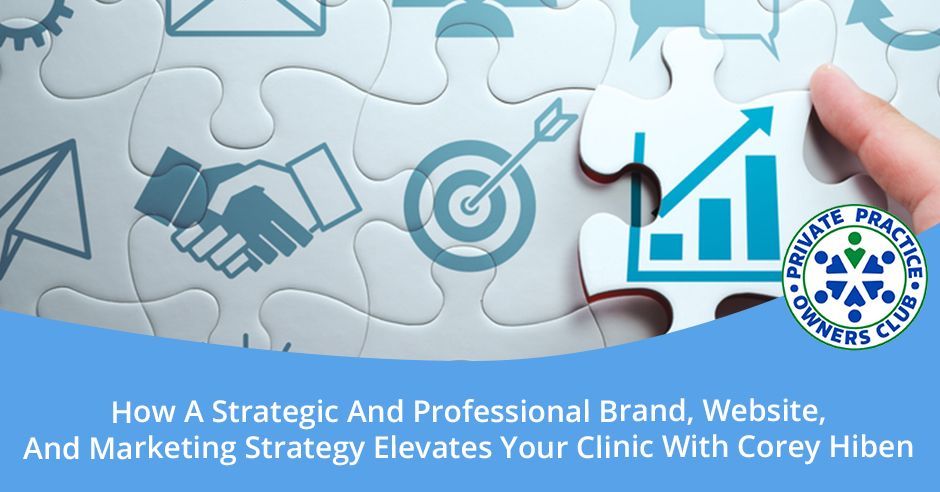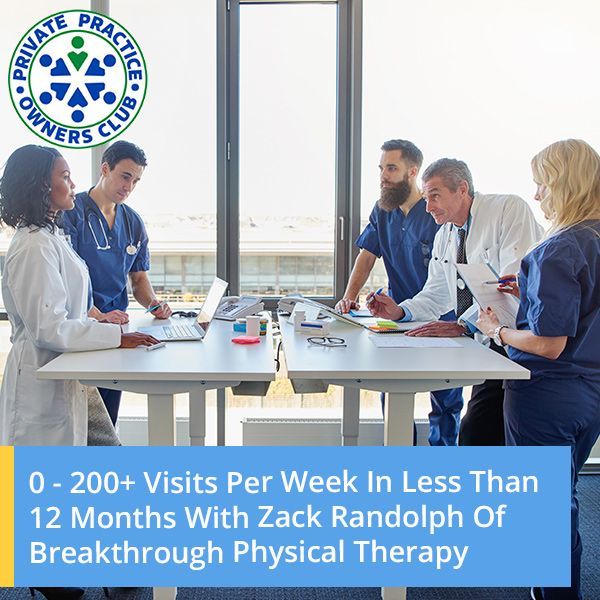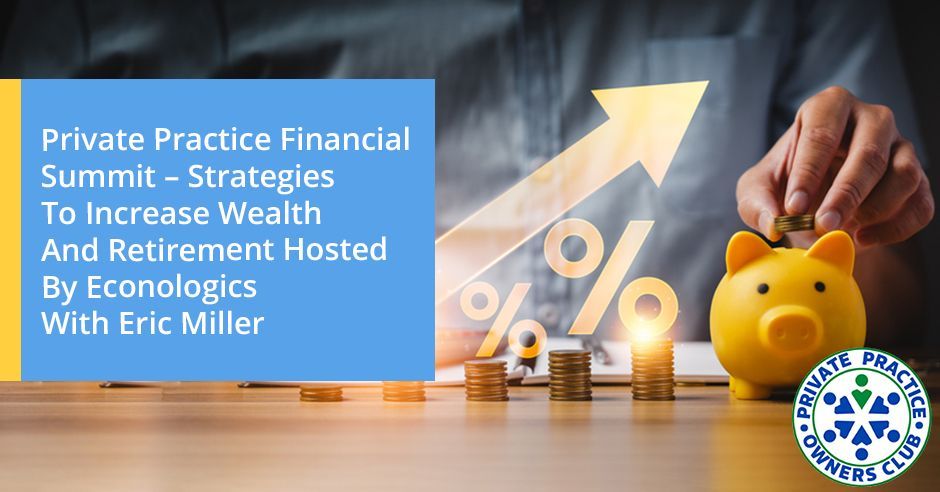Recruiting: Offensive Hiring Vs. Defensive Hiring Changes The Game with Adam Robin
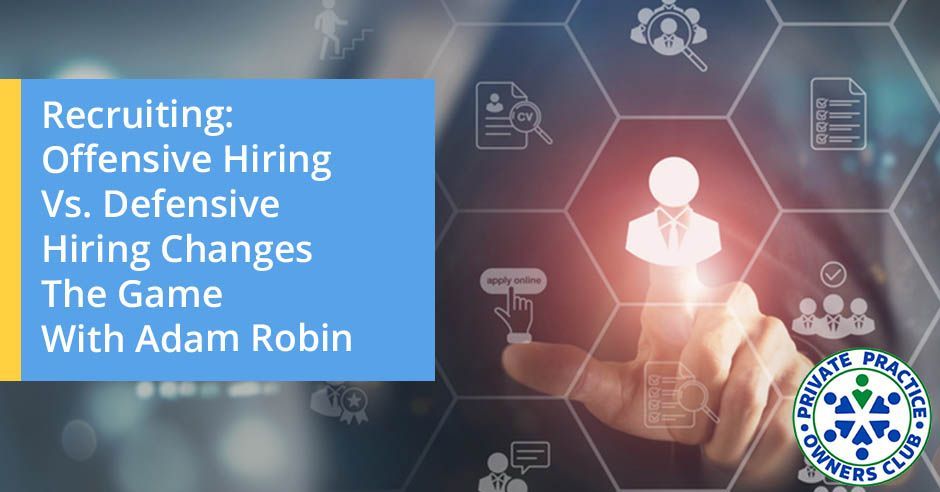
Are you constantly scrambling to fill staff vacancies or dealing with unexpected turnover? What if you could proactively build a dream team that drives growth, instead of constantly playing defense?
Nathan and the guest, Adam Robin, dive into the powerful distinction between offensive hiring and defensive hiring - a concept that can radically transform how you build and scale your Private Practice. You’ll discover why most practice owners unknowingly fall into the defensive hiring trap, which keeps them in a cycle of reaction and instability.
Adam shares actionable strategies to help you get ahead of the hiring curve, attract top talent, and create a sustainable, growth-driven team. Whether you're struggling with staff retention or looking to expand, this episode will give you the tools to build a team that drives your practice forward.
Episode Highlights:
● Offensive Vs Defensive Hiring: Learn the core difference between hiring out of desperation and strategically building a proactive talent pipeline.
● The Cost of Reactive Hiring: Discover how last-minute, defensive hires hurt your practice’s culture, patient care, and bottom line.
● Building a Talent Bench: Gain practical tips for creating a roster of pre-vetted candidates so you’re never caught off guard.
● The Mindset Shift You Need: Understand why hiring before you “need” someone is the key to scaling without burnout.
● Retention Through Culture: Get actionable strategies to create a work environment that keeps your top talent engaged and committed.
Stop hiring in panic mode. Instead, build a practice that attracts and retains top-tier talent effortlessly.
Visit our Linktree for Coaching Services, our Free KPI Dashboard, the PPO Club Facebook Group, and Annual Strategic Planning Services: https://go.ppoclub.com/linktree-podcasts
Love the show? Subscribe, rate, review, and share! https://ppoclub.com/
---
Listen to the Podcast here
Recruiting: Offensive Hiring Vs. Defensive Hiring Changes The Game with Adam Robin
How are you doing?
Good. Fantastic. How about you?
It's a good day. Do you know why it's a good day? It's because March Madness is starting. That's always a good time of year.
I was talking to a practice owner. He was like, “You got your bracket filled out?” I was like, “No.” I used to be obsessed with sports and stuff, and then I fell in love with business. All my energy goes there now. I get tunnel vision.
I get it. I was way more obsessed years ago, but I'm going to do the brackets. I haven't watched a lick of college basketball all year.
Me neither. I'm going to do one too. You inspired me.
In order to be engaged in the season and with your buddies and stuff like that, I feel like I need to be a part of it. It gives me some kind of investment, like Fantasy Football, Fantasy Baseball, or Fantasy Basketball. I don't get too involved in the season unless I have some kind of stake in it. I do that with fantasies. It’s the same thing with March Madness brackets. It keeps me engaged. I'm the same way. There are other things that are fulfilling.
I know it's fulfilling for you because you've been so successful with it. I was looking back. We haven't talked about recruiting for six months. Considering it's such a pain point for owners across the country, we probably need to spend a little bit more time on recruiting in terms of the show and maybe addressing it once in a while.
Mindset Shift For Effective Recruiting
If you are having issues with recruiting, go back and check out Practice Owners Manual Series Part Eight from the first part of September 2024. It is The 5 Buckets of Recruiting that we went over. We may allude to the five buckets in this episode, but this episode is more about mindset and how you need to approach marketing.
We noticed this. We did our workshop in New York City. You could see the mindset, and it's the same mindset no matter where you go. These New York owners, when we talked about recruiting, it was the same tone, the same attitude, and the same mindset that we see across the country. We have to talk to our coaching clients on a regular basis. It all starts with mindset, doesn't it?
I think so. It depends. It starts with mindset, but I also think it starts with recognizing how important it is. People are on their way out of the organization before you realize it.
What's the statistic? 30% of your team is actively looking for another job.

It’s maybe you, one PT, and a front desk person. It’s like, “I have to hire maybe one person a year.” Especially when you start getting to two, three, or four providers and 30% of them already have 1 foot out or maybe are open to exploring other opportunities, before you know it, they're gone and you're sucked back into the business. It's like, “I wish I had been recruiting for the last six months because now, I'm in a bind. My whole life is turned upside down.” That's when people get in trouble. They get sucked back into the business, and they get in trouble.
In the mindset that we're seeing, it's hard to recruit providers. You've heard it all, but let's list some of them. I'll share a few, and then you can share a few. They're asking for too much money. They don't want to be productive. In terms of recruiting, it usually starts with you can't find anybody nowadays. What are some of the excuses you're finding?
“Why would anybody want to work for me? Why would anybody want to choose me over the hospital that's paying more?”
There you go. “I can't provide the benefits the hospital can,” or, “Why would they want to come to a small town?”
“It's hard to recruit in this small rural area. I can understand why somebody would want to leave.” There are a lot of negative mindsets in the recruiting space.
Did you ever have that? You've been so successful. What was your mindset back in the day, and what did it take for you to flip?
I took a realization that I had it. I tell this story all the time. Will Humphreys was the person who helped me flip that.
What'd he say?
He said, “You're a badass.”
That was it?
That was it.
That's why people would want to work for you?
He said it in those words. He was like, “You are a freaking amazing leader. You're incredible. Look at what you've done. People would be silly not to want to join your team.” He spoke that possibility into me. There was this internal weight that got lifted when I realized, “He's right. I do have something I could offer here. What we are doing is cool. It is different. It is unique.”
What was your size at that point?
Probably 3 or 4 providers.
The mindset and attitude you bring, along with your belief in yourself, are reflected in everything you do.
You had a single clinic. Pardon the word, but you're in Podunk, Mississippi.
We’re in small towns.
I've been to your house. It's a small town.
One of my clinics is in a town of 5,000 people. It’s a very small clinic.
Do you think that comes a little bit from physical therapy owners or high achievers? Back in my day, it was harder to get into PT school than it was to get into medical school. Maybe that's changed, I don't know. To get into physical therapy school, you have to have good grades and you have to achieve, and then to get through physical therapy school, it’s the same thing. You have to have good grades. You have to achieve and pass the board exam.
Not only that, you've gone through the rigors of being a staff physical therapist for a number of years and learned your craft to the point where you're confident enough to open up a clinic. For a lot of physical therapists, they think, “This is normal for me,” but what your normal is, is pretty amazing. The owners who do come out and have the guts to risk it and open up clinics are amazing people, but they don't see themselves as that.
What's interesting in this conversation regarding your experience is that you finally recognized, “I've achieved something that a small percentage of the country has achieved. I am worthy, I am amazing, and I do have power, but I'm not willing to recognize that within myself.” The next step is being willing to promote that to other people. That can be hard for some people. It's hard for me still to say, “I've achieved so much. It's pretty awesome. I'm badass.”
I want to highlight that because what switched for us in our program, and we'll experience the same thing, is that we had a mentor who we said was super hard to recruit there. They were like, “Maybe if we used different words and had a different idea about our clinics, then it might be easier to recruit.” That flipped for us. It took some time, but it started with us saying, “People would be crazy not to work for our company. We've got amazing people. We've got amazing leaders. If you don't want to work for us, that's your problem because people want to work for us. We have an amazing place to work.”
Frankly, we were in Podunk, Arizona. It was in the Phoenix area, but not the best part of the Phoenix area. It was on the outskirts. It was a small town surrounded by thirteen prisons. Within the course of time, we had a bench of people who wanted to come work for us. I am not kidding when I said people would tell us, “Let me know when you have an opening. I want to come and work for you guys.” We had 3 or 4 of those going at any given time. It started with us telling ourselves, “We are worthy. We have something of worth. We are valuable. If you don't want to join us, you're crazy.”
It’s like, “You're nuts. What we're doing here is incredible.”
I experienced it. Imagine how you present yourself at job fairs when you're like, “I'm in a small town,” versus, “If you join us, you're going to have one of the best experiences of your life.”
“We're going to transform your life. We're going to be all in.”
“We're going to transform your life. You might not stay with us forever, but your experience with us will be transformative and you will measure every other job outside of us against what you experience here.” Having that kind of attitude, people would be like, “Tell me more,” versus, “I'm in Podunk, Arizona.” They’d be like, “Who else is here?”
The mindset and attitude that you come into it with and the belief in yourself get portrayed through everything that you're doing through the Indeed ads, LinkedIn messaging, phone conversations that you're having with people, and your team. You might even be asking your team who's in your network and who wants to work for you. If you go in with the wrong attitude, then it's going to show forth as you go through all those mediums.
It's a decision. The two quotes that come to mind are, “You will never outearn your self-worth,” and, “You will never sell beyond the degree to which you are sold.” You will never create belief beyond the degree to which you believe, so you're the first person that has to believe. That is a fundamental sales principle. If you take any type of sales training, the very first thing that they're going to teach you is, “What is your pre-sale routine? What do you go into that sales conversation with?” You go in with your mindset.
Remind yourself every single day of how awesome you and your practice are. Decide today to do that and show up a little more optimistic about things—you'll probably make way more money.
Most of them will tell you, “You should have some type of routine that's like, “I'm going to take a deep breath, and I'm going to remind myself how awesome I am, how much I believe in this company, and how much value that I want to bring to this person that I'm about to have a conversation with. I'm going to imagine myself serving them.” You step into the conversation with that and it changes the whole dynamic. Your conviction, who you are, and what you're doing is the thing that will inspire people to be interested.
I feel like we need to provide the readers with some social proof. How many providers have you hired in 2024?
I hired eighteen people in 2024.
Between PT, OT, and speech?
Yeah. We hired a new speech therapist and a new OT. We're about to hire a PT this 2025. This will be the third person we hire this 2025.
Within the first two and a half months.
It's awesome. It's incredible. They know this. Catherine has her own pre-interview routine. She built it. She understands the significance of it.
It sounds like what you said without saying it is that she goes into an interview as a sales process.
Correct. The team meetings are all sales conversations. In the initial evaluation, we should all have some type of pre-routine. “Who do we want to be when we show up for that process, that interview, or that initial phone screen? Let's remind ourselves before we go into that.” You'll start creating movement inside the organization that way because people will be inspired by who you're trying to be.
You're also going to attract those people who aren't afraid to sell. Many therapists are like, “I don't like sales. I'm not a salesperson.”
You better get used to it if you want to grow a business.
If you want a productive team that is self-driven, they better get used to sales, be good at it, and not be scared. That's valuable, number one, that you shared the social proof because people are saying, “You figured it out. What do you know?” You get 2 or 3 therapists a year. Eighteen is pretty significant. I haven't heard anyone else do that over all of my conversations.
It's doable. It is 100% a skillset issue. That's it. You don't know how to recruit. That's the only reason why you're not recruiting. It's not because of where you live. It's not because of any other reason. You don't know how to do it. If you learn the skills, you will recruit. You will move the needle.
The Skillset Of Recruiting: Training And Consistency
Imagine that mindset shift, like, “I don't know how to recruit people,” or, “I'm in a small town,” or all the excuses to, “Maybe I can recruit here. What do I need to know?” You're opening up possibilities. You're not having a fixed mindset or a limited mindset if you say, “What do I need to know in order to recruit in this small town?” or, “In spite of the hospitals providing greater benefit, what's the secret? What do I need to know?”
You need to be trained. You need to train yourself. You need to have the discipline of training yourself and learning the skill so that you can do the thing. That's all it is. Recruiting, marketing, or hiring is all these little series of elevating your skills and you becoming better at the thing. Once you do that, you will create the outcome. That's all it is.

I'm afraid people are going to be like, “What's the secret?” We're not going to get into that, frankly. They're going to be like, “What are you doing on Indeed?” Go back and read our episode from September, The 5 Buckets of Recruiting. We get into that a little bit deeper. Even then, talk to Adam. Reach out to Adam. He can talk to you about some of the basics of it, but it starts with mindset.
If you're not willing to take on the mindset of, “I have an awesome situation. I'm a great leader. People would be crazy to not work for me,” you won’t be able to sell others as well as you're able to sell yourself. If you're not able to sell yourself on that, then start with improving your culture. Maybe start getting some stuff together. Learn how to become a better leader. Talk to us about how we can help you do that. You name it. Get better and sell yourself before you go out into the world, and then we can talk about the minutia and the mechanics of it all. If you don't start with that mindset, all of the mechanics are going to fall flat.
Mindset And Daily Affirmations For Success
I'm going to drop a nugget, and it's going to be pretty obvious. Stop what you're doing, grab a piece of paper, and start writing down how awesome you and your practice are. Write it down and make it 100 words long. Read it every day. Put it in your car, not while you're driving, or wherever you like to consume information.
Remind yourself of how awesome you and your practice are every single day. Decide now to do that and show up a little more optimistic about things. You'll probably make way more money. That's it. You'll start looking at things through the lens of abundance, opportunity, and possibility. You'll be more excited about the way things are going. You'll start moving your organization in a great direction. That's it. If we wanted to talk about the secrets, that's it. I do that all the time. I do that before every sales call. I do that before every interview, every single one. Do that. That'll be the biggest needle mover for you.
I'm going into this not knowing what the title of the episode is. Before we pushed record, we talked about having an offensive versus defensive mindset when it comes to recruiting. This is the beginning of that. When we're going to go on offense, we can say, “We need to figure out what it means to score a basket or score a goal. You name it.”
Taking on the offensive mindset and putting ourselves in a situation so that we can win starts with having the proper mindset and then learning the mechanics and plays that we need to run in order to score. Talk to me a little bit about what it means to have an offensive and a defensive mindset when it comes to recruiting.
Offensive Vs. Defensive Recruiting Mindset
Recruiting and hiring staff retention is very elusive. You can see on your schedule when the schedule is low. You can see, “Visits are low. I need to be up.” The need for your next hire is not so clear. You don't always recognize it. What we tend to do is we wait until somebody puts in a resignation before we realize, “I need to hire,” or we wait until all of our therapists are completely slammed and they're all busting at the seams. Somebody goes on vacation, and then the owners are jumping back into treatment and taking their eyes off the vision. They decide, “Maybe now I need to start hiring,” and it's too late. The damage has been done.
People are getting burned out.
You're losing money, you're impacting your life. You're impacting your family. Everybody's being impacted at that point, and it's because we didn't start recruiting six months ago. That's the defensive mentality. It's like, “I can only hire when I need somebody.”
Either in a positive or negative way, you're being reactionary.
Correct. What I would invite you to do is start to play offense. Start looking for opportunities to hire. Start seeking opportunities as an investment. Like you would take some money and put it into some real estate, gold, Bitcoin, or whatever it is you'd like to invest in, start looking for these investment opportunities because there are amazing people out there who align with your culture and could bring some cool things to the business. If you're not looking for them, you're never going to find them.
There are some people like me who inappropriately equate recruiting, getting out there, and putting out an ad with, “It's time to make a hire right now.” That's not what we're talking about. Putting out an ad, talking to people, and interviewing them does not mean that you're going to put a ring on their fingers. It's not going to seal the deal.
Some people are hesitant to get the ball rolling because they're going to say, “What do I say if I don't have a position available right now?” That's a perfect opportunity to say, “We're always hiring. If you're the right person, we would bring you on.” If you found a complete rockstar who moved into town and said, “I took this clinic from 50 visits to 200 visits in 6 months,” would you not hire them?
I'll hire that guy or girl.
It’s like, “I'll give up all my patients and give them to you so that you can do that to my company.” You're being honest when you're saying that. The vision that we had back in the day was that we wanted a bench. It is so that whenever someone decides to leave for whatever reason and at whatever position, we're going to have a stack of resumes that were already vetted. We've already done the interviews. They've already gone through the process. We need to start making some calls. That's what going on offense is about. Having an offensive mindset versus a defensive mindset means you're being proactive and you're always hiring instead of only hiring when there's a need.

When you're struggling.
Some physical therapist gives you two weeks’ notice unprofessionally, and you're like, “I don't even know if I want to keep you for two weeks, but I will because these patients need to be seen.” What a horrible situation to be in for your patients, for the rest of your team, and for you. You want that person out of there.
If you had the power and had been on offense this entire time, you could say, “Go ahead and pack your bags. You're done. We'll figure this out,” and have some resumes ready to call. You can get there. I've been there. You've been there. You need to understand that there's a cycle that happens. From your experience, you've had all these hires in 2024. What's the life cycle of being in touch with somebody before they finally come on? Is it three, four, or six months?
Yeah, probably so. It’s 3 to 6 months depending on the need. I think about Shark Tank. They don't need another business to invest in. They don't only go to the show whenever they're broke. They're already making it. They're looking for opportunities. They're being more decisive and selective. They're looking for somebody who aligns with their values and a niche that they understand where they feel like they can move the needle with. They're looking for an opportunity, and then they do that. That's how they get rich, because they're looking for opportunities.
That first interview might not be like, “Tell me your biggest strengths and your biggest weaknesses.” It might be something like, “Tell me about you. What are your goals? What are you doing with your career? Do we like each other? What would be fun for you? Do you have a need that I could fill?” You're getting to know that person to see, “As a possibility, is there a reality that exists that we could potentially work together at some point? What would that even look like? Does that excite you?” I'm stacking all of these potential opportunities on my desk that I can choose whenever I want. That's where you start playing offense.
You have to remember that offensive mentality. We're talking about putting yourself in a good mindset, selling yourself before you sell to others, and playing offense on a regular basis. When it comes to boots on the ground, that's when you have to recognize that playing offense means a lot of work consistently done. I know it took some time to ramp up your recruiting systems, but how much time are you spending in the recruiting space each week?
Consistent Daily Recruiting Efforts
At this point, not a whole lot. I have a daily meeting.
A daily recruiting meeting?
Yeah, a daily meeting. It's on the schedule to do it every day.
Who's in your meeting?
Me and the VA team.
You're leveraging the VAs. What if you didn't have the VAs back in the day?
If I didn't have the VAs, I would still try to do one hour a day. I would try to split it up over 1 hour a day, 5 hours a week.
Four to six hours a week.
That's useful, that daily rhythm. My goal is to send 50 DMs a day every day. It's hard not to hire a therapist. You've got to do the work. Once you start building that rhythm, start hiring people, and start growing your business, you can hire somebody to do the DM stuff or the resume screens.
You and I both know there's going to be plenty of people on this that are reading that are going to be like, “Do you mean I have to get on social media for 50 DMs a day?”
You need to put yourself in a good mindset, sell yourself before you sell others, and play offense on a regular basis.
If you want to hire a therapist, you do, so get over it. Do it.
How do you do that? Does it have to be you?
No, it doesn't have to be you.
You can work with people. What you're saying is that it's consistency every day. It's like seeing patients every day. You've got to see patients every day in order to keep the business running. You've got to do some recruiting every day in order to keep the recruiting engine running.
An entire department of your organization is recruiting. You can't ignore it. You can't pretend like it doesn't exist. Unless your goals are not to hire a lot of people, then that's fine. Maybe this episode's better for the people who are trying to grow their business. You've got to recruit every single day. As the CEO, I believe one of your jobs is to be a promoter. Your job is to promote your place as a place where patients can get the help that they need. Your job is to promote your business as a solution to people who are looking for employment opportunities. That's your job. You have to be the promoter of your business.
My recommendation is to find that hour. What I do is I'll create a one-hour daily rhythm. Send twenty DMs. Follow up on four emails. Review one resume. Make one phone call to a university and try to set up a lunch-and-learn. Do that daily rhythm. Show up every day and do the thing. Like anything, if you keep your head down and do the work, you look up 90 days later and you'll have a few interviews lined up.
It’s a complete transformation.
That's it. That's all it is. There's no shortcut. The hard way is the shortcut, so you got to do the work You got to do the thing.
The way around it is through it.
Addressing the hard work and being willing to have the discipline to do the work is the shortest way. I had a mentor of mine say, “All of your dreams and goals are in the work you're avoiding.” You've got to be disciplined and committed to the work and not treat another patient.
Taking on that offensive mindset means, “I’ve got to do something today. I don't have an urgent need for this.” That's exactly when you want to work on it. When you're in a state of emergency or urgency, that's when you start hiring out of desperation or out of emotion, which are the worst positions that you want to be in.
If you have six people who want to work with you and you're complaining about what they want in salaries, then you're in a position of power. That one person who's asking for $120,000, I'm going to be like, “Why would I give you $120,000? I've got five other people who aren't going to work for that.” They could say, “See you.” Whereas if you're desperate, you’re like, “I got to pay $120,000 if I'm going to get them.” That's the worst position to get caught up in. You're in a position of weakness.
The thing that gave me the motivation to commit to that work is recognizing that when I don't have control, I impact everyone else. My not being able to hire people impacts everyone on the team. It's not just about me. When I started to tie that correlation, it gave me the sense of urgency that I needed to have to protect my people. It was a duty for them. That’s when I started to take more action around recruiting. You learn a lot. If you commit to that every day, you'll learn a ton. Your skills will develop and you'll move the needle.
Are you in a position where you still have openings that need to be filled?
Yeah, we're looking for a PT.
Outside of the one that might be coming on?
If there's a lack of clarity, there's going to be hesitancy moving forward.
Yeah. We've got 2 or 3 that we're pushing through the pipeline. We're very much hiring from a place of offense. We don't need a PT, but with a great PT, we could see how there would be potential to free up Catherine, free up Joe, and get those dogs out there hunting more. We could grow the clinic. That's how winning's done.
What do you tell owners who are scared to make that hire? They're on the fence. They know they need to do it. This happens all the time. It was hard sometimes for some clients, but not for you. This is usually their first hire. They’re like, “I know I need somebody, but I don't know how I'm going to fill their schedule and how that's going to impact my finances.” What do you usually tell them at that point?
You hit it. You're fearful because you lack clarity on your financials and on how you're going to fill the schedule. There are two skillsets you need there. You need the skill set of financial clarity, and you need to have a plan on how to fill the schedule. That's it. A carpenter doesn't go into work and is like, “How am I going to nail all these nails today?” He has the hammer and the nails. Your marketing plan is your hammer. Once you have the hammer, you're like, “I use the hammer.” All the fear goes away, and you do the thing. You've got to elevate your skills.
If there's a lack of clarity, then there is going to be hesitancy moving forward.
Your brain is going to want to stop you because it hasn't identified the solution yet. It's going to play on loop like, “I can't move forward because I don't understand how this is going to work.” You have to orient yourself and educate yourself, and then you can move forward.
Some people are happy in that naivety because then they don't have to commit.
Embracing Discomfort And Taking Action
Not everyone has to commit. You're not a bad person if you don't commit. In order to be an entrepreneur, you have to have this desire to be better. Challenge yourself to do some hard things.
Be uncomfortable.
You know that with that sacrifice comes a greater sense of possibility. You've got to want it. Sometimes, you have to be willing to jump in without having all the answers. Knowing that you're going to surround yourself with some good people, you're going to learn and educate yourself, and you're going to hustle will drive you through.
We covered a ton of good stuff, but is there anything else you want to share about offensive versus defensive recruiting?
I'll reiterate that your people already have one foot out of the door, whether you know it or not. That should scare you a little. If it doesn't, good luck. Have a little bit of urgency around recruiting. Let’s solve the recruiting thing and have a good year.
I would love someday for someone to come to us with recruiting problems and say, “I'm recruiting 4 to 6 hours a week and I'm consistent with social media outreach, LinkedIn, emails, and universities, but I still can't find somebody.” I haven't seen it yet. In spite of the attitude adjustment, that's the first place I go. I'd be like, “Are you selling something positively? I would love to see you do all those things and then say, “I can't find anybody.”
It's a good point. I've never seen somebody truly give it all they got and fail. It doesn't happen. The people who don't make progress, and I'm talking to myself, are usually the people who are avoiding the thing. They're not doing it or they're inconsistent with it because other things are getting in the way, whatever it is, whether it be distractions or urgent things. Hopefully, that will at least give the reader some peace knowing that all they have to do is do the work. It's that easy. We don't have to overcomplicate it.
What we're usually seeing, and you can correct me if I'm wrong, is, “I'm posting on Indeed. I don't know what else to do.” Maybe they also take students who are in universities and they're posting on Indeed. Maybe they're refreshing every 30 days. That's usually the extent of it.
Even doing that, you should get some leads.

If you're not actively taking students on a regular basis.
At that point, it might be a mindset issue. You're not converting.
You're not clear as to how to sell somebody on your clinic.
Correct.
I highly recommend you follow this up by going back to our 5 Buckets of Recruiting episode. If you have further recruiting questions, then you need to talk to Adam.
Talk to me. I'll point you in the right direction. I’ll help you in any way I can.
Reach out to him. He's on all the socials. Join our Facebook group. You can DM through that. You can find him on Facebook and LinkedIn. He's on LinkedIn on a regular basis. His email is Adam@PPOClub.com. You can email him as well. You need to start putting out the effort.
Let's do it.
Thanks. This was a good one.
Thanks.
Important Links
- The 5 Buckets of Recruiting
- Private Practice Owners Club on Facebook
- Dr. Adam Robin on Facebook
- Dr. Adam Robin on LinkedIn
- Adam@PPOClub.com
All Rights Reserved | Private Practice Owners Club



